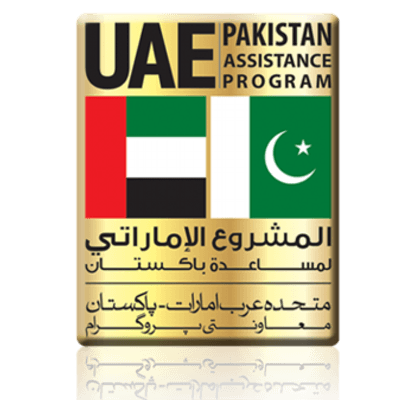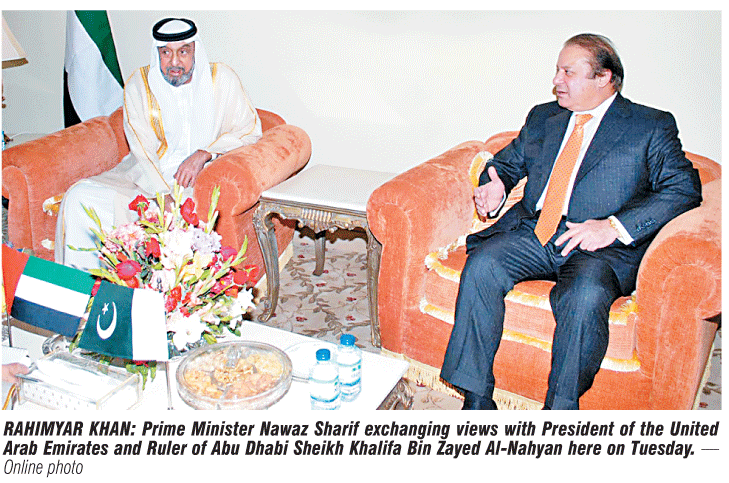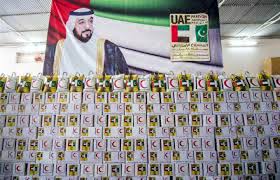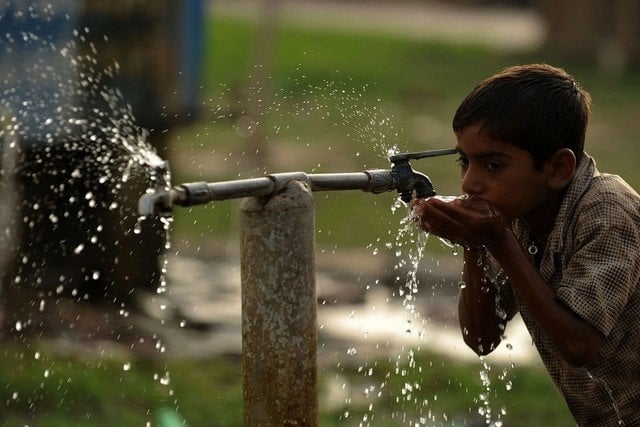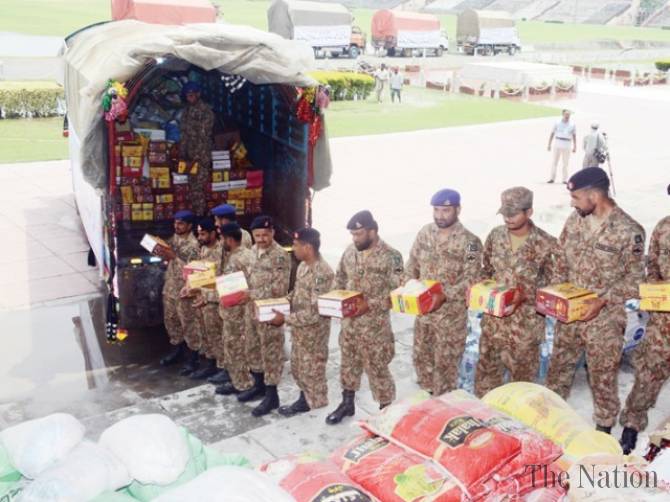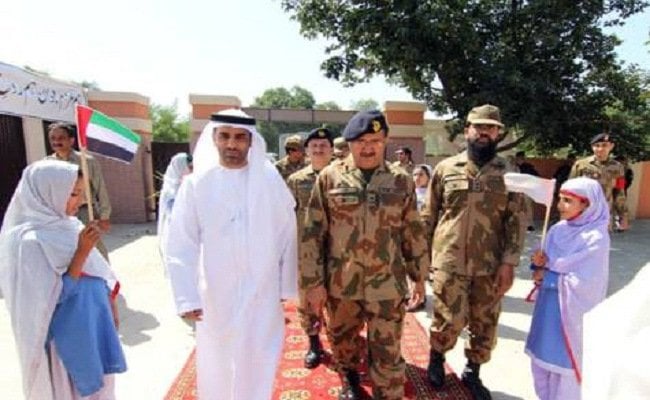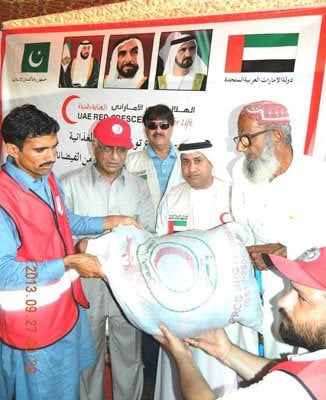Mehmood Ul Hassan Khan
Upon the directives of H.H. Sheikh Khalifa bin Zayed Al Nahyan the President of UAE, “the UAE-PAP was initiated in January 2011 at a total cost of US$100 million for the reconstruction of infrastructure damaged by devastating floods and natural calamities in Khyber Pakhtunkhwa province, Bajaur and South Waziristan districts of the tribal belt. The projects were started to provide better life to the local people by creating jobs. The said projects focused education, public health, roads, bridges and supply of water treatment plants and networks.
Different Fields Details
Infrastrctureal Develpoment: To build, maintain and restore schools, colleges and academic institutions while helping to upgrade the educational infrastructure and prepare students to earn academic credentials and obtain training experience.
Health Care Facilities: To build, renovate, maintain and refurbish hospitals, clinics and medical institutes to extend badly needed modern medical care to Pakistani families in order to alleviate their suffering and protect them against diseases and epidemics.
Water Supply Chains: To build water treatment and purification plants, extend delivery networks to provide remote towns and villages with potable water and eliminate the problem of undrinkable water.
Humanitarian Assistance: To deploy humanitarian assistance to the poor, orphans, needy and homeless, provide food and healthcare to help them overcome their ordeal.
Right from the beginning, UAE-PAP has been changing the lives of the poor and vulnerable people in the country. It pledges qualitative life by providing, education, clean drinking water, health and the last but not the least infrastructure facilities. It upholds social nets in the difficult areas of Khyber Pakhtunkhwa province, Bajaur and South Waziristan districts of the tribal belt.
It potrays the kindness and generosity of the UAE, its leaders, charities, financial instutions and of course people. It upholds the love and affection of the UAE towards Pakistan and its people. It shows signs of hope, inspiration and the last but not the least, life. It displays the true picture of humanity, commitment, sacrifice and perfection. It widens the horizons of mutual cooperation in the diverse fileds of economy, human resource develpoment, education, science & technology and the last but not the least, political cooperation.
UAEPAP is indeed a blessing for the country and especially Khyber Pakhtunkhwa province, Bajaur and South Waziristan districts. It effectiveness is unparraeled. Long live the friendship of Pakistan-United Arab Emirates.
Tools for Sustainable Development
Till now, over 100 projects worth millions of dollars focusing on major areas of social development including health, education, water and infrastructure have been completed which are significantly contributing to the development of these sectors in these areas.
UAE-PAP Development Plans
According to a report of the UAE-PAP, the program includes the building and equipping of 53 state-of-the-art educational projects, 43 schools and 10 colleges. It has worked along a comprehensive redevelopment plans that take into account the harsh geography and the rough weather conditions of the region.
i. Health
In the field of health, the said projects embrace the building, equipping and maintenance of 7 hospitals and clinics in Khyber-Pakhtunkhawa and South Waziristan. Two of these, Sheikh Khalifa bin Zayed Al Nahyan Hospital and Sheikha Fatima bin Mubarak Hospital, are specialized maternity and pediatric hospitals to provide health-care and emergency services for women and children. Moreover, the (UAEPAP) launched the final phase of its seven valuable projects relating to healthcare in the different parts of the country i.e. Bajaur, Khyber Pakhtunkhwa and South Waziristan.
Best available health care system/facilities
According to its officials these projects would be an icon in the field of health care in these areas. The projects are constructed and completed at a cost of over US$17.1 million. The directorate of the UAEPAP is hoped that it would provide best possible available health care system/facilities to people living in war-ravaged areas of the KPK province. State-of-the-art hospital in Bajaur has now been completed while the other six healthcare centers/units/hospitals are expected to be completed during the current year 2013. The said projects include four modern hospitals, two clinics and a medical institute in Pakistani remote areas which lack the basic healthcare services.
These projects stand for a noble cause of protecting the children, women and men from the virulent diseases, seasonal infectious illness and natural catastrophes if any. It would provide them first-aid facilities, nursing, surgery, child health care along with all other diversified medications and health care facilities. Special attention is given to old-aged people and infants. Two of these four hospitals, the 100-bed Sheikh Khalifa Specialised Hospital are under construction in Saidu Sharif, Khyber Pakhtunkhwa province, and the 50 bed Sheikha Fatima bint Mubarak Hospital in Shulam area of South Waziristan. The modern medical institute will serve two hundred male and female students. The facilities will be fully-equipped to treat patients in the poor areas.
Sheikh Khalifa Hospital
Moreover, the Sheikh Khalifa Hospital will be first in the Khyber Pakhtunkhwa province having ambulance helicopter. Hopefully, it would enhance medical efficiency by reducing distances and crucial time limits to reach at the doors of the hospital through the facility of ambulance helicopter.
Sheikha Fatima bint Mubarak Hospital
The Sheikha Fatima bint Mubarak Hospital in Shulam features South Waziristan’s first dialysis centre, first preventive medicine centre and first children’s immunization center. It would introduce the concept of healthy living in the people living in these areas where health consciousness is neglected. It would control the occurring of the fatal diseases relating to kidney, liver, gastro, stomach, digestive system, gut and many more.
Bajaur Hospital
The 70-bed Bajaur hospital consists of a dialysis centre, an electro encephalograph (EEG) unit, two quarantine units, two operating rooms as well as wards for chest diseases, skin diseases and emergency and outpatient clinics to serve a population of 800,000 people of the underprivileged region. According to medical practitioners, the said hospital would keep the people healthy by taking care of their sinking and dysfunctional hearts. The chest diseases consisting of respiratory system disorder, minor deformities, and of course the inefficiency of the chest wall and muscular action of the intercostal muscles and diaphragm along with obstacles in proper ventilation will be checked thoroughly at the said hospital.
ii. Clean Drinking Water
With the aim of providing clean water and protecting people against diseases and epidemics, about 70 drinking water supply projects have been accomplished, 44 of them in Khyber-Pakhtunkhawa and 20 in the South of Waziristan region.
iii. Development of Infrastructure
Sheikh Khalifa Bridge
Sheikh Khalifa Bridge has been rebuilt over Swat River damaged by flood. The 330-metre bridge serves 70 thousand persons which represents an architectural icon and a tourist destination with its unique design that resembles Abu Dhabi’s Al Maqta’ Bridge and its historic fort.
Sheikh Khalifa Bin Zayed Al Nahyan Road, funded by Khalifa Bin Zayed Al Nahyan Foundation, is one of the most important infrastructure projects in the South Waziristan. It is a strategic project stretching from the city of Wana to Angor Adda. The 50-kilometers road, with its 5 over passing bridges, is of strategic importance for transportation between Pakistan and Afghanistan.
iv. Education
Furthermore, “the UAE-PAP” inaugurated another new preparatory school in Kalam village, Khyber Pakhtunkhwa, for further supporting of educational development in the province. It is hoped that the newly established Haryati School will serve 225 male and female students from prep to primary levels. The multi-purpose school building consists of eight class rooms, a computer lab and administration bloc.
Jahanzeb Post Graduate Degree College (JPC)
During 2014, to support Pakistan’s educational system, the UAE Project to Assist Pakistan officially inaugurated the Jahanzeb Post Graduate Degree College (JPC), the oldest educational institution in Malakand, Khyber Pakhtunkhwa province, Pakistan, marking the completion of the reconstruction of the institution at a cost of US$1.209 million.
The UAE Project to Assist Pakistan (UAE PAP), in collaboration with Pakistan Army, reconstructed JPC, which was established in 1952 to grant degrees in 7 disciplines, and it accommodates 300 students. JPC was rebuilt on an area of 3,577 square meters to house modern academic departments. The facility has a main lecture auditorium, 10 classrooms, 4 laboratories, 16 teaching and administrative staff offices and an administration building.
Chief of Staff of the Pakistan Army (COAS)
In his remarks at the inauguration ceremony, Chief of Staff of the Pakistan Army (COAS) General Raheel Sharif, expressed thanked President His Highness Sheikh Khalifa bin Zayed Al Nahyan for his constant support for Pakistan through his generous humanitarian initiatives which have their focus on human development and contribute to efforts to boost several sectors such as education, healthcare, water, transport and road networks.
He affirmed that the people of Pakistan will always remain grateful for the genuine humanitarian attitudes of H.H. Sheikh Khalifa bin Zayed who spares no efforts to support the humanitarian causes of the people of Pakistan at times of crisis.
Chief of Army Staff General Raheel Sharif also inaugurated a post graduate college and a paramedical institute at Saidu Sharif. These projects were completed by Pakistan Army Engineers as part of the post operation reconstruction phase under the UAE Pakistan Assistance Programme (UPAP).

